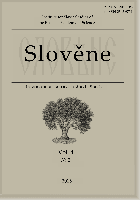
Slovene-International Journal of Slavic Studies
metrics 2024
Cultivating Knowledge Across Slavic Borders
Introduction
The Slovene-International Journal of Slavic Studies, published by the Russian Academy of Sciences, Institute of Slavic Studies, serves as a vital platform for scholarly discourse in the fields of Cultural Studies, History, Linguistics, and Religious Studies. Since its transition to Open Access in 2012, the journal has enriched academic dialogue, enabling wider circulation and accessibility of research findings. Based in the Russian Federation, the journal supports interdisciplinary approaches, inviting contributions that push the boundaries of traditional Slavic studies. With a commendable ranking in the Q3 quartile across multiple categories as of 2023 and respectable Scopus rankings, it stands out as a crucial resource for researchers and students alike, enhancing their understanding of Slavic and related cultural contexts. The journal's commitment to fostering international collaboration and dialogue positions it as an invaluable asset for anyone engaged in the complexities of Slavic studies.
Metrics 2024
 0.12
0.12 0.10
0.10 0.10
0.10 5
5Metrics History
Rank 2024
Scopus
JCI (Web Of Science)
Quartile History
Similar Journals

Slavia-Casopis pro Slovanskou Filologii
Fostering Innovative Research in Slavic StudiesSlavia-Casopis pro Slovanskou Filologii is an esteemed journal dedicated to the advancement of Slavic philology, published by the SLOVANSKY USTAV AKAD CESKE REPUBLIKY in the heart of the Czech Republic. With its ISSN: 0037-6736, the journal serves as a vital platform for scholarly exchange, embracing a rich academic tradition since its convergence years beginning in 2002. The journal has achieved notable recognition, with a Q3 ranking in Linguistics and Language and a Q2 in Literature and Literary Theory as of 2023, highlighting its contribution to these dynamic fields. Although it does not currently offer open access, its rigorous selection of articles ensures that it remains a crucial resource for researchers and practitioners alike, facilitating a deeper understanding of Slavic languages and literature. Scholars benefit from the journal's extensive research backdrop, enhanced by its current ranks in the Scopus database, underscoring its significant placement within the academic literature landscape. The editorial scope of Slavia promotes innovative inquiries that reflect cultural, historical, and theoretical perspectives endemic to Slavic studies, making it indispensable for professionals, students, and enthusiasts invested in the exploration of Slavic linguistic and literary heritage.
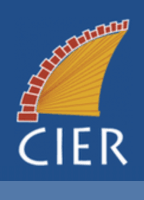
Cahiers d Etudes du Religieux-Recherches Interdisciplinaires
Innovating Research in the Realm of the SacredCahiers d Etudes du Religieux-Recherches Interdisciplinaires, published by the CENTRE INTERDISCIPLINAIRE ETUDES RELIGIEUX, is a premier open-access journal dedicated to the interdisciplinary study of religion. Since its inception in 2007, this journal has fostered scholarly communication and innovative research in the field of religious studies, providing a platform for varied perspectives that range across history, sociology, theology, and anthropology. With its ISSN of 1760-5776, it is easily accessible to researchers, professionals, and students seeking to expand their knowledge and engage with cutting-edge studies in religion. Situated in Montpellier, France, this journal plays a vital role in disseminating impactful research and enhancing academic dialogue among scholars of diverse backgrounds. By emphasizing open access, Cahiers d Etudes du Religieux ensures that significant insights into religious phenomena are available to a global audience, encouraging collaboration and exploration within the scholarly community.

Studia z Filologii Polskiej i Slowianskiej
Bridging Disciplines in Linguistics and Cultural NarrativesStudia z Filologii Polskiej i Slowianskiej is a prominent journal published by the Polish Academy of Sciences, Institute of Slavic Studies, focusing on the rich and diverse field of linguistics and language studies, particularly within the Slavic context. With the ISSN 0081-7090 and E-ISSN 2392-2435, this open-access journal has been a valuable resource for researchers, professionals, and students since its transition to an open-access model in 2014. It features rigorous peer-reviewed articles that contribute to the understanding of linguistic phenomena and cultural narratives across Slavic languages. Recognized within the Q3 quartile of linguistics and language in 2023, it ranks at the intersection of arts, humanities, and social sciences, providing insights that echo through disciplines such as sociolinguistics, psycholinguistics, and philology. In its ongoing publication trajectory from 2011 to 2023, Studia z Filologii Polskiej i Slowianskiej continues to foster academic discourse and collaboration, positioning itself as a key player in the global linguistic community.
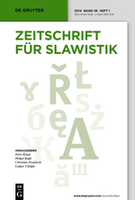
ZEITSCHRIFT FUR SLAWISTIK
Decoding the Essence of Slavic Literary TraditionsZEITSCHRIFT FUR SLAWISTIK, published by WALTER DE GRUYTER GMBH, is a renowned journal focusing on Slavic studies, encompassing various fields such as cultural studies, linguistics, and literary theory. With its ISSN 0044-3506, this distinguished journal has been a significant contribution to the academic community since its inception in 1956, continuing to disseminate valuable research until 2024. While maintaining a strong reputation within several academic categories, ZEITSCHRIFT FUR SLAWISTIK holds a Q3 ranking in Cultural Studies and Linguistics and Language, and a Q2 ranking in Literature and Literary Theory as of 2023. This positioning underscores the journal’s impact, particularly as it caters to an audience of researchers, professionals, and students invested in the rich tapestry of Slavic culture and language. Access to this journal is not open; however, its comprehensive articles are crucial for anyone aiming to explore and deepen their understanding of Slavic linguistic and literary traditions. The journal's work is essential in fostering cross-disciplinary dialogue and advancing scholarship in these vital areas.

Sibirskii Filologicheskii Zhurnal
Navigating the Rich Tapestry of Literature and LinguisticsSibirskii Filologicheskii Zhurnal is a prestigious academic journal published by the Russian Academy of Sciences, Institute of Cytology and Genetics. With ISSN 1813-7083, it is dedicated to advancing research in the fields of Cultural Studies, Linguistics and Language, and Literature and Literary Theory, and has achieved notable rankings, including Q2 in Cultural Studies and Linguistics, and Q1 in Literature for 2023. The journal provides a platform for scholarly discourse, contributing valuable insights to its fields with an evolving scope that spans from 2018 to 2024. Though not an open-access journal, Sibirskii Filologicheskii Zhurnal serves as a vital resource for researchers, professionals, and students in the Russian Federation and beyond, fostering a deeper understanding of linguistic and literary phenomena. Its commitment to high-quality content makes it an essential addition to any academic's library.

Zbornik Matice Srpske za Slavistiku-Matica Srpska Journal of Slavic Studies
Advancing Scholarship in Slavic Linguistics and LiteratureZbornik Matice Srpske za Slavistiku - Matica Srpska Journal of Slavic Studies, published by Matica Srpska in Serbia, is a prominent academic journal focusing on the diverse and rich field of Slavic studies. With an ISSN of 0352-5007 and a commitment to advancing knowledge in linguistics, literature, and cultural contexts, this journal serves as a vital resource for researchers, professionals, and students alike. Although designated as an open access journal, its significance is highlighted by its ranking in the lower quartiles of 2023 across various categories, including Q4 in Linguistics and Language and Q3 in Literature and Literary Theory. The journal's Scopus rankings further reflect its position, with a percentile of just 8th for Language and Linguistics. These factors underscore the journal's ongoing contribution to Slavic scholarship from 2019 to 2024, fostering dialogue and exploration in a field that remains crucial for understanding Eastern European cultures and languages.

Lingua Montenegrina
Exploring the Depths of Montenegrin Language and LiteratureLingua Montenegrina is a distinguished academic journal dedicated to exploring and advancing the fields of Montenegrin language and literature. Published by the Institute of Montenegrin Language and Literature, this journal serves as a vital platform for researchers, educators, and students interested in the nuances and development of Montenegrin linguistics, literature, and cultural studies. With an ISSN of 1800-7007, it contributes significantly to the scholarly discourse in the region and beyond. While the journal operates under a traditional subscription model, it ensures that its readership has access to high-quality research that is pivotal for understanding Montenegrin identity and cultural expressions. The commitment of Lingua Montenegrina to rigorous academic standards and its focus on regional studies positions it as an essential resource for those looking to deepen their understanding of the Montenegrin language and its literary heritage.
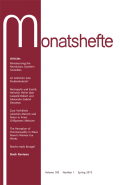
Monatshefte
Illuminating the Dynamics of German CultureMonatshefte is a prestigious academic journal published by the University of Wisconsin Press, dedicated to fostering scholarly discourse in the field of German Studies. With its ISSN 0026-9271 and E-ISSN 1934-2810, Monatshefte serves as a vital platform for researchers and students, offering peer-reviewed articles that delve into literature, culture, and linguistics. The journal plays an essential role in advancing knowledge and understanding of German intellectual traditions, making it indispensable for anyone interested in the dynamics of German culture. Although it is not an Open Access publication, its rigorous selection of high-quality research articles ensures its impact within the academic community. For researchers aiming to stay at the forefront of German Studies, Monatshefte provides a wealth of insights and critical analyses, fostering enhanced academic dialogue and innovation.

Slavia Meridionalis
Exploring the rich tapestry of Slavic culture and history.Slavia Meridionalis is a distinguished open-access journal published by the Polish Academy of Sciences, Institute of Slavic Studies, dedicated to advancing scholarly discourse in the fields of Anthropology, Cultural Studies, History, Linguistics and Language, and Literature and Literary Theory. With its ISSN 1233-6173 and E-ISSN 2392-2400, this journal has made significant strides in promoting research since its inception in 2014. Operating from Warsaw, Poland, Slavia Meridionalis aims to serve as a pivotal platform for researchers and students alike, fostering interdisciplinary collaboration and knowledge dissemination. The journal holds respectable rankings in its various categories, some achieving Q3 status, which reflects its commitment to quality scholarship within the academic community. By providing open access to its readership, Slavia Meridionalis ensures that pivotal research is readily available for the global audience, thus enhancing its relevance and impact across diverse fields.
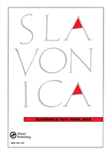
SLAVONICA
Navigating the Intersections of Language, History, and CultureSLAVONICA is a distinguished academic journal dedicated to the exploration and analysis of Slavic studies, incorporating a wide array of cultural, historical, and linguistic perspectives. Published by Routledge Journals, Taylor & Francis Ltd, this journal serves as a critical platform for interdisciplinary scholarship, emphasizing the dynamic nature of Slavic cultures and languages. Though it currently does not offer Open Access, SLAVONICA is an important resource for researchers, professionals, and students seeking to engage with the latest academic discourse in the fields of Cultural Studies, History, Literature, and Linguistics, achieving a recognized place in the Q4 quartile across several categories as of 2023. With coverage spanning from 1994 to 2024, and its commitment to fostering academic inquiry, SLAVONICA plays a vital role in elevating the understanding of Slavic heritage and contemporary issues, making it essential reading for anyone interested in the complexities of this region.